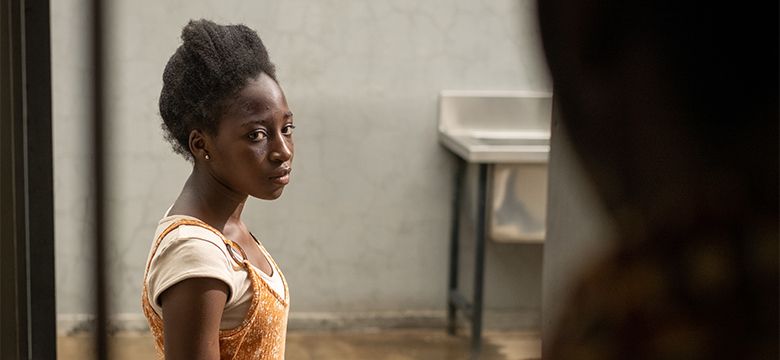Is Nollywood failing the girl child?
On April 29, 2021, Hiny Umoren, a 26-year-old graduate in Uyo, the tourist friendly capital of Akwa Ibom, a state in Southern Nigeria set out for a job interview. Hours later, her best friend took to Twitter to solicit help towards finding Hiny as her phone had suddenly become unreachable shortly after she sent a disturbing voice message.
Two days after a social media led nationwide hunt began to find Hiny, news of her dreadful demise made headlines, traumatising the entire country anew. Hiny’s quest for a decent job led to her being raped and murdered.
Hiny and Shine, the title character in Beautie Masvaure Alt's impactful social drama, Shaina share something in common, the tragedy of sexual violence. These young women, one real, the other fictional are both exposed to harm and become easy prey due to economic hardship. This raw factoid spoke to me instantly while screening Shaina at the Durban International Film Festival (DIFF). But it isn’t the only reason I found the film so striking.
Shot in Zimbabwe, Shaina, written and directed by Masvaure Alt follows the story of Shine, a teenager who overcomes daunting challenges on her way to securing a tertiary education. Shaina transcends aesthetics to critically put forward a socially conscious themed picture about the rights of the girl child. The film clears the dust off the conversations on education, and sexual health with sub-plot devices delving into teenage pregnancy, economic hardship, gender-based violence and how the intersection of these themes affect victims.

According to a 2014 UNESCO report, 57% of the 8.7 million children out of school in Nigeria are girls. Years later, Nigeria still records one of Africa’s- if not the world's- highest rates of children out of school.
It has been seven years since the Chibok girls sparked worldwide outrage. Over 100 of the 276 girls abducted from their school are reportedly still missing. Since Chibok, even more kids have been abducted from their schools. Perhaps the most famous of them all, Leah Sharibu remains in captivity, whereabouts unknown. School targeted attacks have been frequent occurrences this year with parents resorting to paying heavy sums to retrieve their wards.
Follow the news closely enough and it is easy to come to the conclusion that Nigeria is pursuing a war against women and children. Ever so often, something erupts and one of these countless rape or murder cases become high profile enough to warrant communal outrage and a resolve by officials to pursue justice. Rarely is justice ever administered though.
A 2020 investigative report conducted revealed that 90% of rape victims in Nigeria were women within the age group 18–55 years, with a third of the victims aged between 1 and 10. Even Nollywood, Nigeria's bustling film industry has not been left out of sexual harassment discussions. Indeed this sordid reality has lingered for decades, spoken in hushed tones among industry practitioners. Sex for roles has been a norm for as long as the industry has existed. Victims- up and coming actors mostly- risk being blacklisted by the establishment whenever they dare to speak up about their casting couch experiences.
Films that incite social, political or economic discourses are not exactly the bread and butter of the industry. Nollywood producers appear obsessed with box office numbers and concentrate their strategies on lowest common denominator comedies that can appeal to as broad an audience as possible. Once in a while, a filmmaker like Desmond Ovbiagele will defy the recurrent culture to make a powerful film on girl child rights.
In his latest film, The Milkmaid- Nigeria’s submission to the Oscars’ foreign language category last year- Ovbiagele realistically confronts terrorism with a narrative of two sisters kidnapped by insurgents.
Ovbiagele's The Milkmaid and Masvaure Alt's Shaina are potential tools that could become educational materials for young girls in Nigeria. The choices that these filmmakers make in service of delineating the trials and triumphs of their young female characters make the difference in terms of representation. The films, even though suffused with heavy doses of realism, are also inspirational in that the girl child can glean on screen, pieces of what life could be like beyond their immediate circumstances.
Shaina showcases not just its lead character but also her neighbourhood friends. One struggles with the reality of teenage pregnancy while another dabbles into prostitution to support her family. These young girls, though forced to deal with these life-altering choices, remain resilient.
The healthy choices that Masvaure Alt's characters make in the end lead to some kind of redemption for the characters and respite for viewers. Happy endings may best be suited for fiction but, the rights of the girl child are inviolable. It is a cold, hard world out there but little girls deserve the basic, boring normalcy of childhood. They also deserve to know that they can be heroines too.
Film can be this safe space for girls, even when the world around them isn't.
This story emanates from the Talent Press, an initiative of Talents Durban in collaboration with the Durban FilmMart. The views of this article reflect the opinions of the film critic, Precious 'Mamazeus' Nwogu